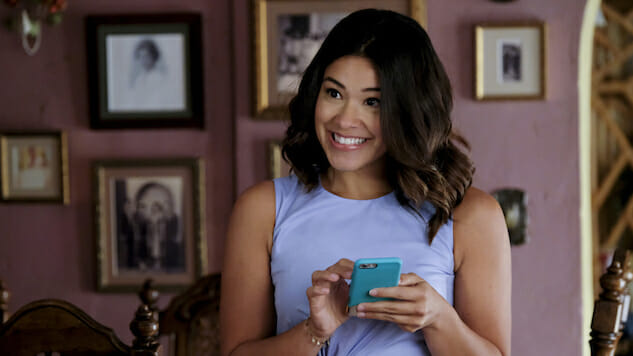Jane the Virgin at Seventy-One: Fun, Funny and More Emotionally Resonant Than Ever
Photo: The CW
Despite what my extremely smart and respectable colleagues here at Paste might have collectively determined, The CW’s tropically-saturated meta-telenovela, Jane the Virgin, is the best show on television. Go ahead, fight me. I’ve followed star Gina Rodriguez’s lead and taken up boxing. I’m ready for you.
OK, we don’t have to fight. I, like all smart Paste readers, have a personality outside of my favorite television show and can accept a plurality of opinions about the art we all consume. But believe me when I say that Jane the Virgin, which airs its winter finale, “Chapter Seventy-One,” on Friday, has not lost any of the magic or ambition it exploded onto the wild accidental-artificial-insemination ride of “Chapter One” with back in 2014. Thanks to knockout performances from an ensemble cast with no weak links, the gleefully sassy Narrator, given voice by Anthony Mendez, and the ever-fresh metatextual commentary slapped in text, tweetstorm, or animation on the face of every episode’s fourth wall, Jane is, in its fourth season, brighter and warmer and more devastatingly funny than ever: If it’s not the best show on television right now, then it is, at the very least, the most joyful.
This superlative isn’t new: when it premiered, Jane the Virgin was an almost singular bright spot of uncynical joy not just in the middle of The CW’s superhero- and vampire-heavy slate, but on television as a whole. Sure, it had the Southern charm of the Rachel Bilson vehicle Hart of Dixie for hour-long company on its own network, BFFship vehicles Playing House and Faking It making love-filled half-hour premieres on USA and MTV, respectively, and both Brooklyn Nine-Nine and Parks and Recreation repping Mike Schur’s hyper-positive brand on network television. But it also had You’re the Worst and Silicon Valley and Transparent and BoJack Horseman premiering alongside the already established Arrested Development, Veep, It’s Always Sunny in Philadelphia, Please Like Me, Girls and, for better or worse, Louie, all working at the same time to pull TV comedy in the most miserably cringey opposite direction. And while a few other brave anti-cynics have joined Jane’s ranks in the last three years—Rachel Bloom’s critical darling Crazy Ex-Girlfriend and Mike Schur’s existential candy box The Good Place, among them—the tide of comedy—hell, the tide of daily reality—has turned undeniably in the direction of the sad horse.
It is, then, all the more crucial that Jane the Virgin has remained so steadfastly joyful, even (especially) in the face of the many and dire twists the past three and half years have thrown Jane’s and everyone in her orbit’s way, twists which might have gotten away playing for camp in a real telenovela (I see you, Los Viajes de Guillermo, you insane, almost-real wonder), but which, in Jennie Snyder-Urman’s meta-literary telenovela, land hard with grounded emotions and lasting consequences. For all the accidental artificial insemination premise seems like a big goof, Jane really did get pregnant without any say in the matter. Rafael (Justin Baldoni) really got three kids, a murdered father, and a surprise disinheritance without any say in any matter. Alba (Ivonne Coll) really nearly got deported for being pushed down some stairs and landing in the hospital without documentation. Petra (Yael Grobglas) really did get forced into deadly decision after deadly decision because of a heartless mother and impoverished upbringing. Luisa (Yara Martinez) really has a substance problem and severe mental health issues. Rogelio (Jaime Camil) really did miss out on his daughter’s entire life. Xiomara (Andrea Navedo) really did miss out on her own career to raise her daughter alone. Michael (Brett Dier) really died.